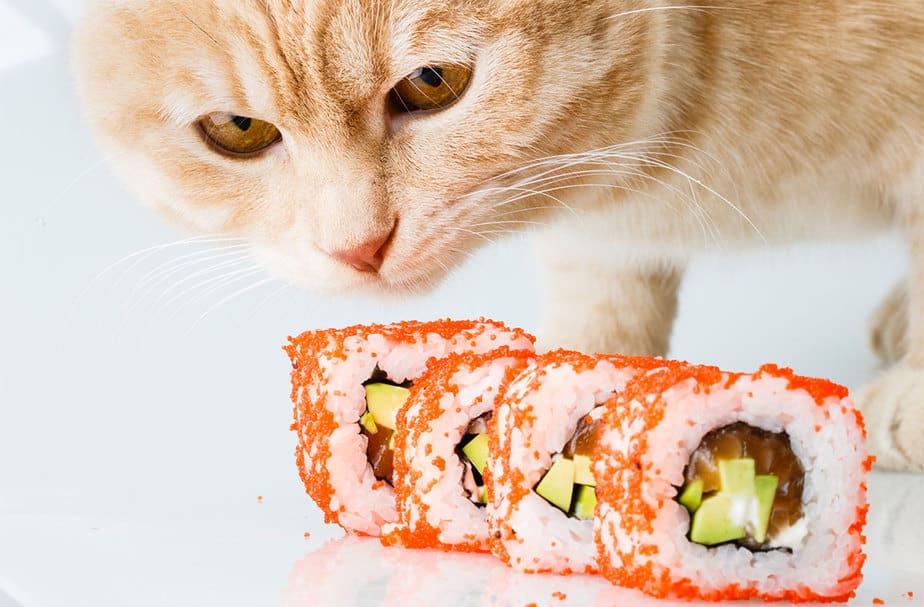We know cats are obsessed with fish, whether it be watching them swim on the screen or eating a can of tuna. What could be different when eating raw fish then? Can cats eat sushi safely like other seafood?
This traditional Japanese dish is popular across the globe and one of the main associations when thinking about this country and its cuisine. Sushi comes in various styles, but all of them have certain ingredients in common.
Seafood isn’t a natural choice of food for felines, but it’s a great source of protein. Fish is an extremely healthy dish for humans, but can the same be said for cats?
Is sushi good or bad for cats?
The debate about whether cats can eat sushi is a long-lasting one. Some argue it’s safe because it’s just some fish and rice, but there’s really more to it than just these two ingredients.
While sushi can be beneficial to human health, unfortunately, the same can’t be said for felines. Our furbabies deserve the best and if you share this opinion, you’d want to hamper your cat’s decision to gulp down some of your sushi.
It might come as shocking, but raw fish, or any raw seafood for that matter, isn’t advisable for feline consumption. There are many reasons behind this fact and we’re more than happy to provide you with some.
You’ll be thankful you first asked yourself “Can cats eat sushi?” instead of offering her some.
Can cats eat raw fish?
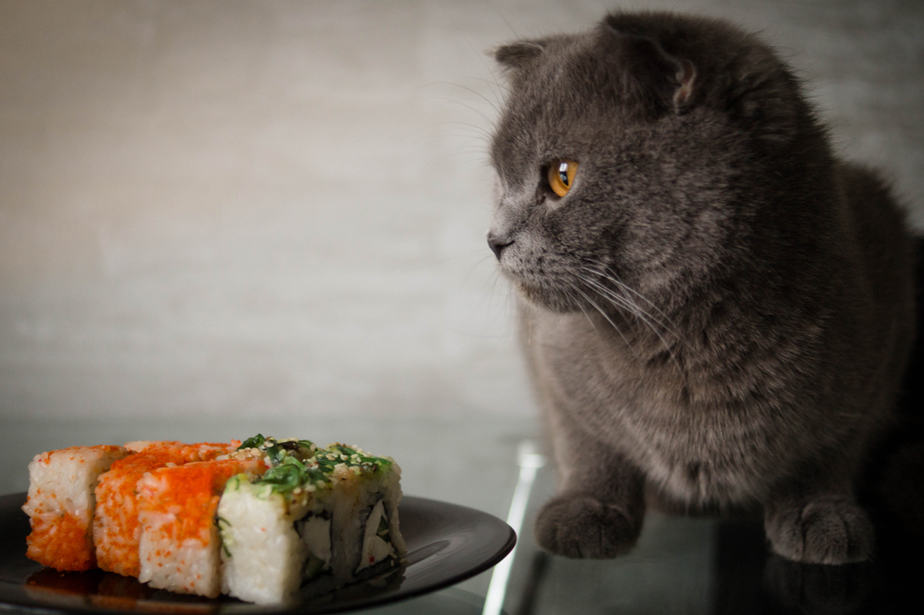
Even with all of the health benefits for humans, there are a few drawbacks to your cat eating sushi. Although these small fish bites can be beneficial to us, you should keep the following in mind.
Raw fish can occasionally be contaminated with parasitic nematodes called Anisakis. Cooking or freezing will kill these parasites. As long as you don’t feed your cat raw fish, you shouldn’t have any problems.
Moreover, fish often have significant quantities of mercury. This is a hazardous build-up of heavy metal that occurs naturally, which can cause your cat to become shaky and dizzy.
Mercury poisoning, on the other hand, is more likely to develop from larger fish. It’s a rare occurrence because sushi comes in small sizes.
Raw foods are not recommended for cats. Some individuals feed raw meat to their cats, however, the meat usually comes from a certain trusted brand. Raw-fed cats eat a wide choice of certified and tested meals.
Never offer raw meals to your pet on your own. It’s dangerous and could seriously jeopardize your cat’s health. Bacteria and germs are some of the dangers that raw foods pose.
Cooking the fish for your cat will save both her health and your stress. All possible bacteria can be killed by properly cooked fish at high temperatures. It’s also easier to chew and digest for your cat.
Make sure you don’t use any seasonings or spices while cooking it. You’re putting your furchild at risk by adding table condiments like salt. Sodium poisoning can occur in cats if they consume too much salt.
If your cat consumes sushi that has been seasoned and spiced, she may develop a variety of digestive issues. Nausea and vomiting, as well as other moderate symptoms like diarrhea, are frequent with an upset stomach.
Is rice safe for your pet?
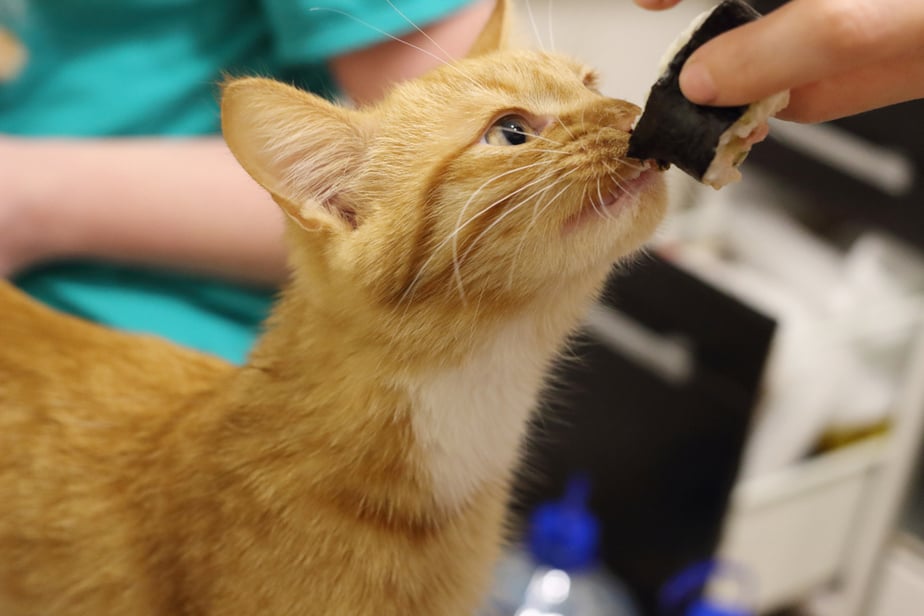
Yes, it’s safe and cats can consume modest amounts of rice. It’s non-toxic, so a little in their food won’t hurt them, but don’t give too much because it’s not a necessary part of their diet. If you feed your cat a complete and balanced cat food, adding rice to the mix won’t provide her with any additional nutritional benefits.
Furthermore, too much of this filler may prevent them from eating the healthy food they require! Your furchild is an obligate carnivore, which means she’s designed to eat primarily meat and can’t digest carbohydrates.
Felines, unlike humans, don’t require carbs in their diet. Some commercial cat meals include grains such as rice, but only in modest amounts to aid in digestion.
Brown rice is more nutritious than white rice because it has more fiber. It’s crucial to remember that too much carbohydrate in a cat’s diet might result in obesity. Obese cats are more prone to a variety of health issues, including diabetes and joint problems.
Can cats eat sushi because of seaweed?
You probably never had to think about your pet eating seaweed. “Can cats eat sushi? What could go wrong?”
Well, here is some good news: cats can eat seaweed in small amounts. Seaweed is a nutrient-dense superfood that provides your cat with a wide range of minerals and bioactive substances.
It’s is an excellent approach to promote gut health. Seaweed contains prebiotics, which provide food to the live bacterial cultures found in feline GI tracts, allowing them to combat harmful bacteria. As a result, felines fed prebiotics benefit from improved digestion, nutrient absorption, and immune system function.
Seaweed is also a great source of omega 3-fatty acids. These lipids can be found in a variety of marine sources, such as seaweed. However, it does not contain as much omega-3 as, say, tuna.
It can, however, benefit your cat’s skin, coat, and joints. Omega-3 fatty acids help to strengthen hair follicles, resulting in healthier fur and reduced shedding.
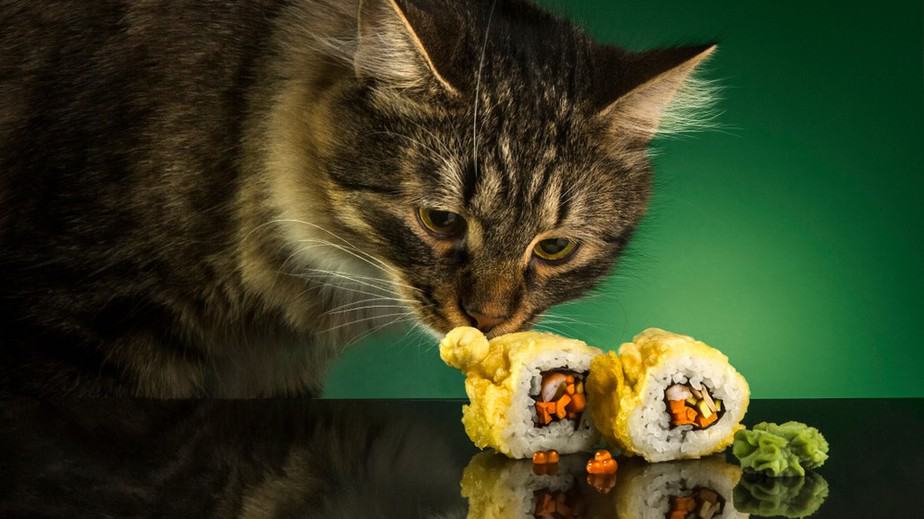
These fats are also anti-inflammatory, which helps to reduce joint inflammation. This is particularly beneficial for senior cats. It makes it easier for them to move around and reduces joint pain.
Omega-3 makes jumping and other actions simpler for younger cats. Seaweed polyunsaturated lipids, such as omega-3 fatty acids, have numerous health benefits for cats. They can aid in the maintenance of healthy cholesterol levels. As a result, the risk of stroke and heart disease is reduced.
Antioxidants are another advantage of seaweed. Cats’ cells are far stronger to mend and protect themselves as a result of antioxidants. This makes cats more disease-resistant and helps them avoid the detrimental effects of aging.
Is soy sauce dangerous to cats?
Just like any other food, sushi is made with various sauces like wasabi and soy sauce. Humans can consume soy sauce because it’s beneficial to their health, but cats can’t. While soy sauce is used in a variety of dishes, it shouldn’t be served to your kitty.
There’s no need to be concerned about a lick from your bowl now and then. Unless your cat has a history of allergies. Cats are prone to soy sauce allergies, so watch what your feline consumes.
The main concern lies in its high salt concentration. Soy sauce in big doses can be harmful. It can result in sodium poisoning, which can lead to serious medical problems.
Because this sauce is used in so many dishes, it’s necessary to be extra cautious, especially if you’re ordering Japanese takeout. Cats can eat sushi, but without soy sauce. Otherwise, we can’t guarantee that they won’t become sick!
Do cats even like sushi?
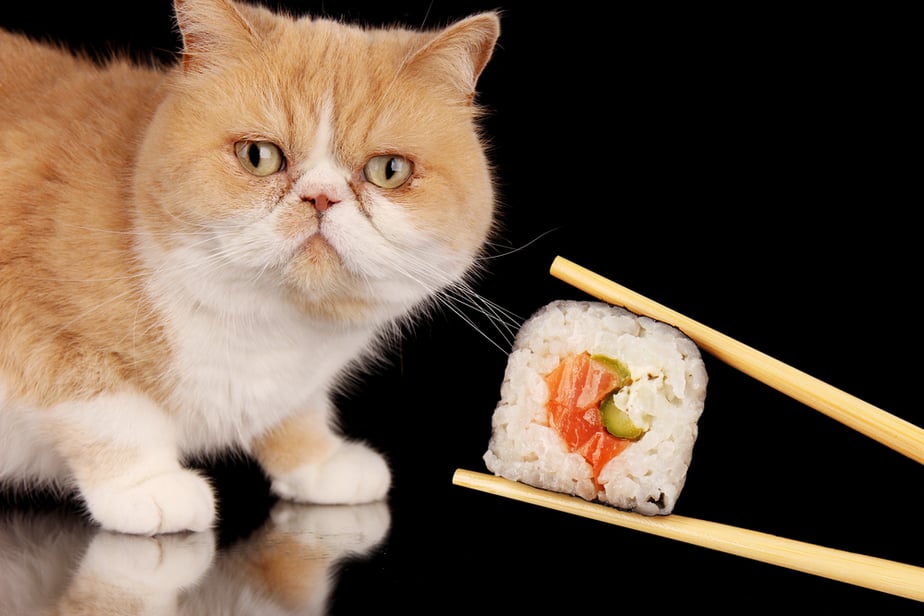
Cats love meat, so why wouldn’t they enjoy some of the raw fish? Our pets are curious creatures and will most likely find a way to sneak up to our plates. Sushi smells yummy, but is she really going to eat it?
If your pet is a picky eater, she’ll probably decline the offer. With the various spices and sauces, raw fish and seaweed just aren’t enough to entice your cat’s senses. Yet, sushi made with squid can make those whiskers move!
Cooked squid in little, chopped-up bits is safe for your cat. Squid isn’t the easiest to chew, so you’ll need to take some time with preparation before you serve it to your pet. You’ll avoid a choking episode if you do it this way.
Is sushi a high-calorie food?
Cats require specific calorie quantities. It’s a source of energy that powers their bodies and keeps their systems in check. Even so, if she consumes more calories than she needs, your cat may suffer from a variety of health problems.
Sushi is a terrific choice if you’re searching for a quick supply of calories to carry you through the day. But do you know what happens if your furchild consumes too many calories in a day?
Excessive amounts of calories won’t do her any good. She will store extra calories as fat if she consumes more than her daily calorie allowance.
This isn’t a good situation for her joints or overall health. The additional strain on her joints may increase her chances of developing arthritis later down the road.
Can cats eat fat-dense food like sushi?
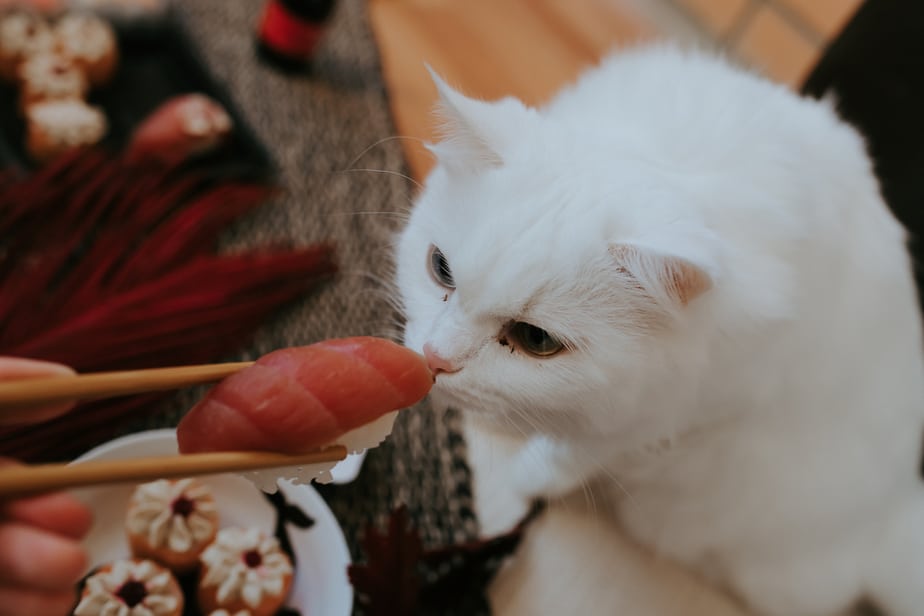
Cats require a specific amount of fat to survive. It’s a source of energy that powers their bodies and keeps their systems in check. Even so, if she consumes more fat than she should, your cat may develop a variety of health problems.
Because they are saturated fats, the fats contained in sushi are unhealthy. These have been shown to increase cholesterol levels in both cats and humans. If cholesterol levels continue to rise, higher risks of stroke and heart disease are probable results.
Final thoughts
You should never give your cat raw fish meat like sushi. It has the potential to harbor pathogens that could make your feline ill. Uncooked meat can cause a variety of infections, some of which are fatal to cats.
Cooked fish is an excellent choice that may be consumed in moderation. When cooking seafood for your pet, such as fish and crab, avoid adding any sauces or seasonings. Soy sauce and spices are difficult to digest and may induce gastrointestinal upset.
I’m sure the last thing you want is for your furchild to have an upset tummy and not be able to keep her supper down. So, make sure you avoid serving sushi to your cat as a treat.
Related post: Can Cats Eat Sashimi? Does It Make Their Lives Dreamy?

